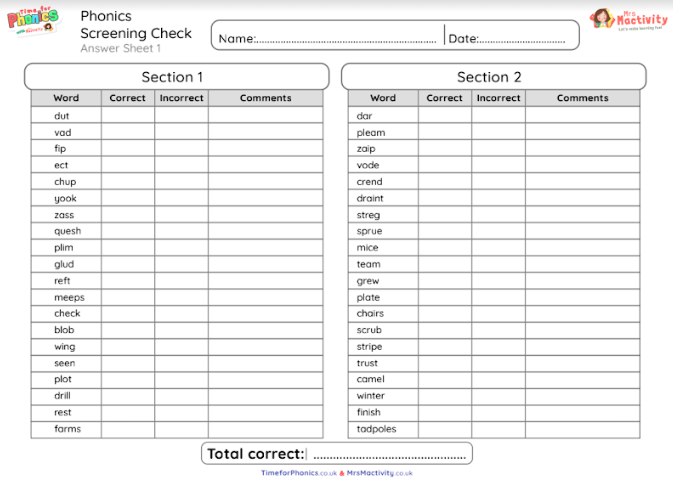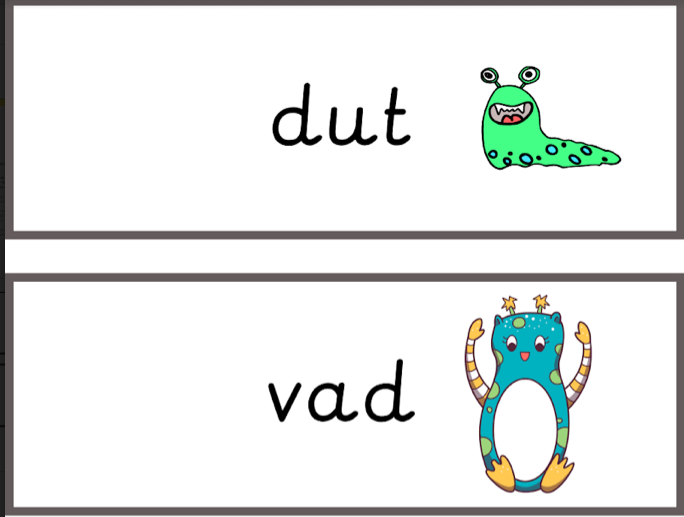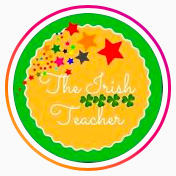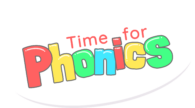How to support children with the phonics screening check

Every year, except for during the pandemic, children in year 1 are required to take part in a phonics screening check, to ensure they are reaching the required standard when it comes to their phonic knowledge.
What is the phonics screening check?
The phonics screening check typically takes place in June in year 1, and is administered by the class teacher, or a member of teaching staff who is known to the children, and trained in phonics. The check typically takes between 4 and 9 minutes to complete though children can be given rest breaks if needed. The check is designed to test the child's ability to decode and blend sounds, and their recall of taught phonemes. The idea is that this helps teachers to identify which children need additional support and intervention if there are any gaps in their phonic skills.
As part of the check, children will be shown a list of 40 words - some are real, some are pseudo (nonsense). The child has to decode the word and the teacher has to mark it as correct or incorrect. Children are shown the pseudo words to ensure that they are actually able to decode using their phonics skills, to make sure they are not sight reading known words.
Some of the graphemes used in the screening check represent a number of different phonemes. When decoding the real words, the pupil has to choose the correct phoneme for the word, for example the ‘ea’ in ‘team’ should not be pronounced as the ‘ea’ in ‘bread’. However, when decoding the pseudo-words, all plausible alternative pronunciations are acceptable.
The actual phonics screening check paper gives you an idea of how to score the check and the acceptable pronunciations of the pseudo-words.
It's worth noting that some of the pseudo-words in the screening check contain letters which can be pronounced differently by children according to their regional accent.
For example, the ‘a’ in ‘zass’ can be pronounced as /z s/ or as the ‘ar’ sound - /za:s/.
Alternative pronunciations in keeping with regional accents are acceptable, even if the child does not usually use that regional pronunciation.
When administering the test, you should accept the child’s last answer, even if they have pronounced the word correctly earlier. in 2019 the phonics check threshold mark was 32 out of 40 - any score above this means the child has achieved the expected standard (but you'd need to check what the threshold is for the current year).
Does the phonics screening check make children nervous?
No, in fact children are usually not aware they are even taking part in a test. If the child has been taught using a systematic, synthetic phonics scheme such as Time for Phonics, then they should be well prepared for the test, especially if they have been given time to practice with our phonics screening check materials, including our mock test.
When do schools receive the phonics screening check papers?
Schools will receive the screening check materials between the 16th and 20th May, and must be stored securely. Each set of materials will contain one:
- copy of ‘Phonics screening check: pupils’ materials’.
- pad containing 30 copies of ‘Phonics screening check: answer sheet’.
- copy of ‘Phonics screening check: practice sheet’.
- copy of ‘2022 Phonics screening check: scoring guidance’.
How does Time for Phonics help with the phonics screening check?
If you are a school member, you can download phonics screening check resources below including:
- mock screening check PowerPoint.
- mock screening check scoring guide.
- mock screening check answer sheet.
- and more.

This should provide ample opportunity for children to prepare for the check. In addition, you can use our phonics screening check games which have a selection of real and pseudo words that children must read and decide whether they are real or silly words. Perfect phonics screening check preparation resources.
Free screening check resources for parents
We have also provided a free list of words for parents that they can use at home to help their children prepare for the check. This can be accessed on a smart phone or tablet for ease of use.

Get 14 days no-obligation free access to our synthetic phonics scheme and resources. Sign up today!

For full access to our unique games and resources
What our wonderful community says...





